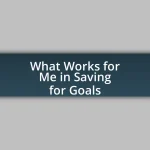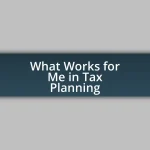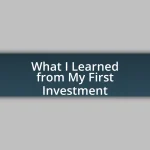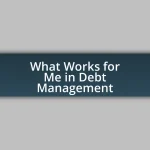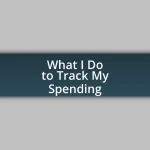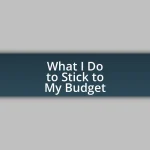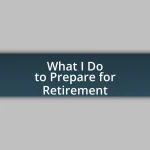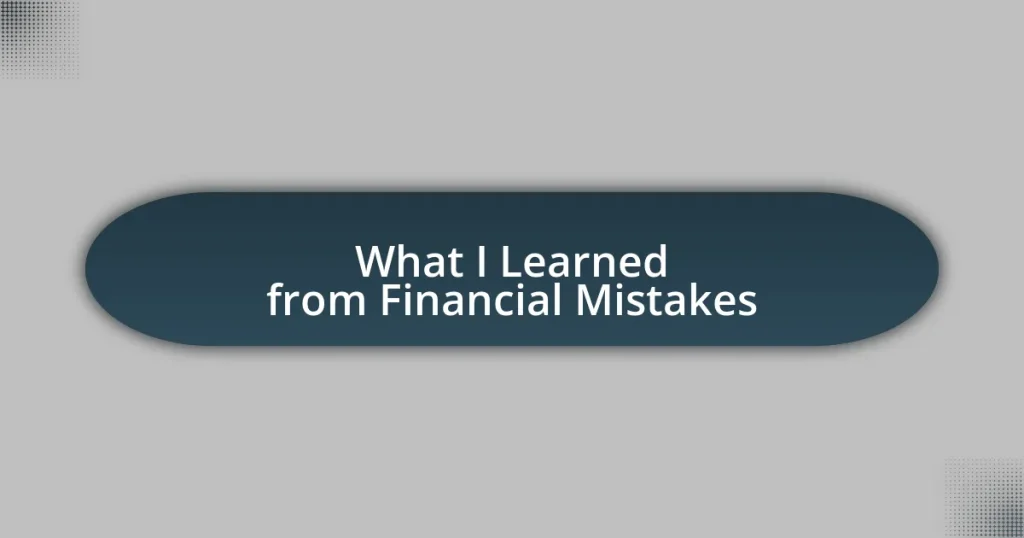Key takeaways:
- Financial mistakes stem from impulsive decisions and lack of understanding; viewing them as learning opportunities fosters personal growth.
- Creating a structured budget and seeking professional advice enhance financial decision-making and clarity.
- Developing an emergency fund and understanding the nuances of debt can significantly improve financial resilience and management.
- Emotional discipline in spending is crucial; recognizing feelings tied to purchases helps maintain long-term financial health.
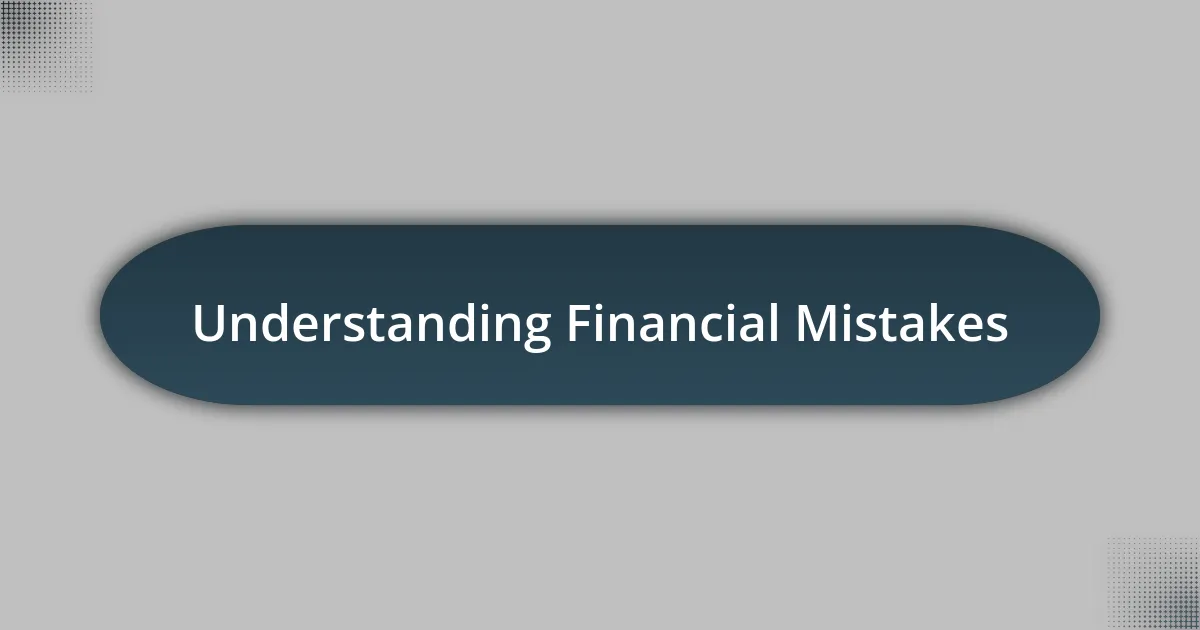
Understanding Financial Mistakes
Understanding financial mistakes goes beyond just tracking numbers; it’s about reflecting on our decisions and their impact on our lives. I remember my first big purchase—a car I couldn’t truly afford. At that time, I thought owning a new vehicle would elevate my status, but all it brought was anxiety over monthly payments that stretched my budget too thin.
As I navigated life’s ups and downs, it became clear that mistakes are often rooted in a lack of understanding or hasty decisions. Consider this: how often do we buy things simply because we believe we’ll feel happier? I’ve certainly been guilty of that, chasing fleeting satisfaction rather than considering long-term consequences. It teaches us that emotions play a significant role in our financial choices, and recognizing this can help us make better decisions in the future.
Once I started to view my financial mistakes not as failures but as learning opportunities, everything changed. Adopting this mindset shifted my perspective, allowing me to embrace mistakes and analyze what went wrong. Isn’t it liberating to think that each misstep could lead to greater wisdom? This personal growth not only improved my financial habits but also made me appreciate the journey toward financial literacy.
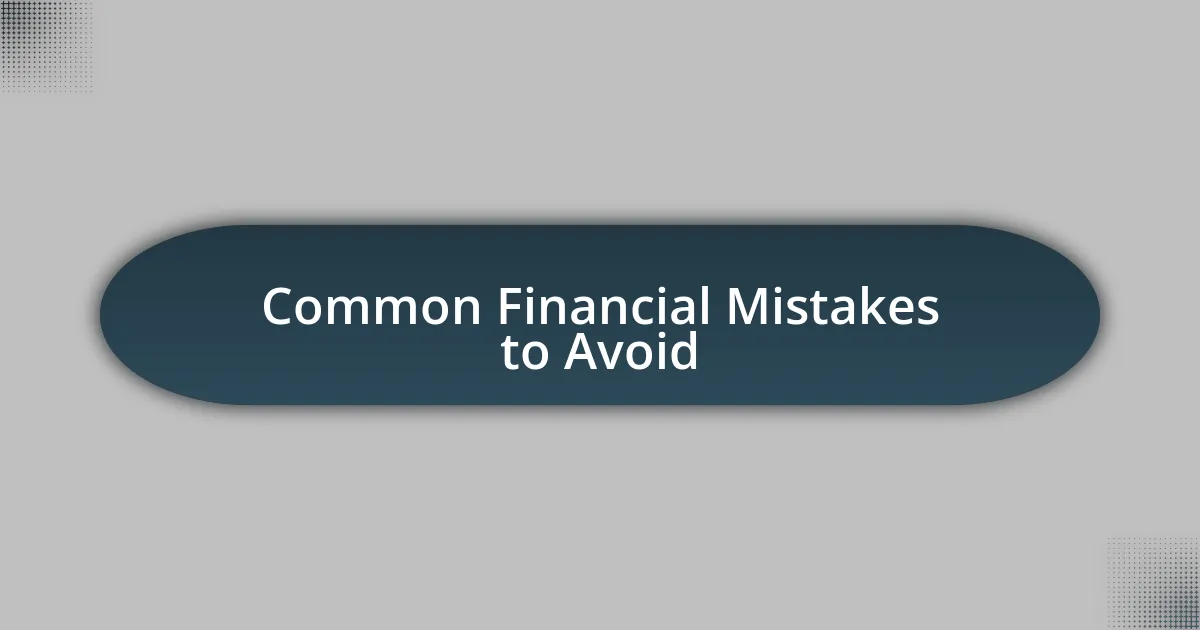
Common Financial Mistakes to Avoid
When it comes to common financial mistakes, overlooking the power of budgeting is a big one. Early in my financial journey, I thought budgeting was a tedious chore, something unnecessary since I kept track of my expenses in my head. However, that approach led me to occasional overspending and unexpected financial stress, which made me realize the importance of having a structured plan.
Here’s a list of financial mistakes to steer clear of:
- Neglecting to create or stick to a budget
- Ignoring the impact of high-interest debt
- Underestimating emergency savings needs
- Failing to diversify investments
- Making impulse purchases without research
Each of these pitfalls can create a ripple effect in your finances. I remember a particular moment when I impulsively bought a gadget because it was on sale, only to realize later that it drained my savings for a more essential need. It’s moments like these that highlight the importance of careful financial planning and mindfulness in spending.
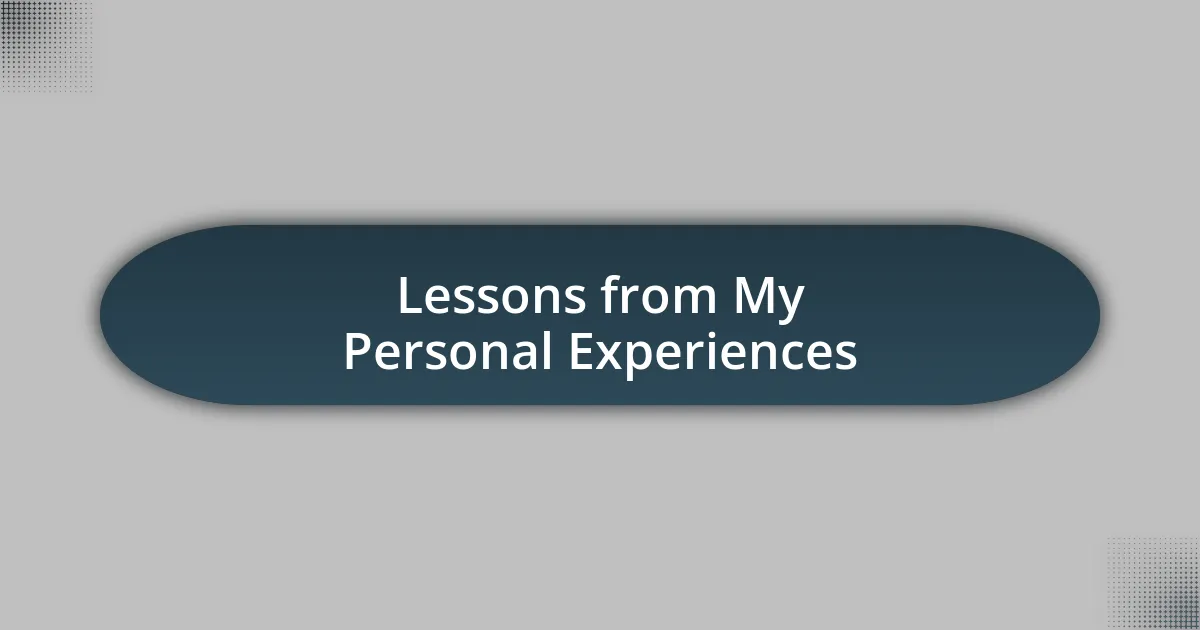
Lessons from My Personal Experiences
Reflecting on my financial blunders, one of the most significant lessons I’ve learned is the value of maintaining a safety net. Early on, I underestimated how much I’d need for emergencies. When an unforeseen car repair bill hit, I felt the panic set in. I had to scramble to find the funds, which led to utilizing credit cards I had just begun to pay down. This experience underscored the importance of having an emergency fund that can cushion those unexpected hits.
Another eye-opener was the realization that not all debt is created equal. As someone who once thought all debt was bad, I learned the hard way that high-interest debt can be crippling. I frequently carried a balance on my credit card, aiming to manage it better but ultimately adding to my stress. Now, I prioritize paying off high-interest debt first. This shift has helped me direct my financial energy toward building wealth rather than just managing debt.
Finally, the lesson of patience in investment stands out in my mind. In my eagerness to jump into the stock market, I made hasty decisions based more on trends than research. I remember losing a significant amount of money because I thought I could time the market. Now, I take a more measured approach, focusing on long-term growth instead of quick wins. It’s about building a portfolio that reflects my financial goals, not just following the crowd.
| Financial Lesson | Personal Experience |
|---|---|
| Emergency Savings | Scrambled to pay for an unexpected car repair due to lack of savings. |
| High-Interest Debt | Learned that not all debt is the same; high-interest debt is crippling. |
| Investment Patience | Lost money by jumping into stocks without research, now focus on long-term growth. |
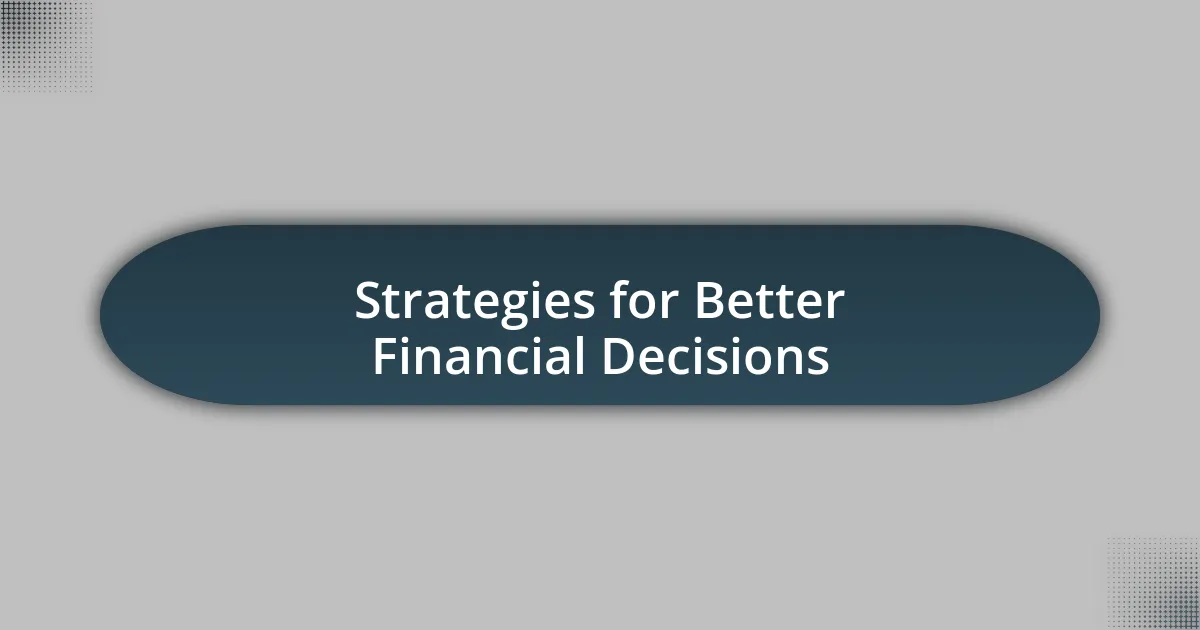
Strategies for Better Financial Decisions
When it comes to making better financial decisions, one strategy that has consistently worked for me is creating a detailed budget. Initially, I viewed budgeting as a restriction, something that would limit my spontaneity. However, after tracking my expenses for a few months, I realized it was empowering. I could see clearly where my money was going and identify areas for improvement. Have you ever felt surprised by your spending habits? It was a revelation for me, and I now view budgeting as a roadmap to my financial goals, not a cage.
Another critical strategy I’ve adopted is the practice of seeking advice. In the past, I often dismissed the idea of consulting financial advisors or experienced friends. But once I started tapping into the knowledge of those around me, I discovered new perspectives that educated me immensely. It’s like having a mentor for every financial decision! By discussing major purchases or investment opportunities with others, I now have more clarity and confidence in my decisions. Don’t underestimate the value of a second opinion; sometimes, it can illuminate things you might have overlooked.
Finally, I’ve learned the importance of setting specific financial goals. When I first started on my financial journey, my aspirations were vague—saving money and becoming wealthy were my only metrics. It wasn’t until I mapped out concrete, achievable goals, like saving for a vacation or contributing to retirement, that I found clarity and motivation. I asked myself, “What does financial success look like for me?” Establishing milestones transformed my approach. I often celebrate small victories along the way, which keeps me engaged and committed to my long-term vision. What about you? Have you defined what financial success means in your life?
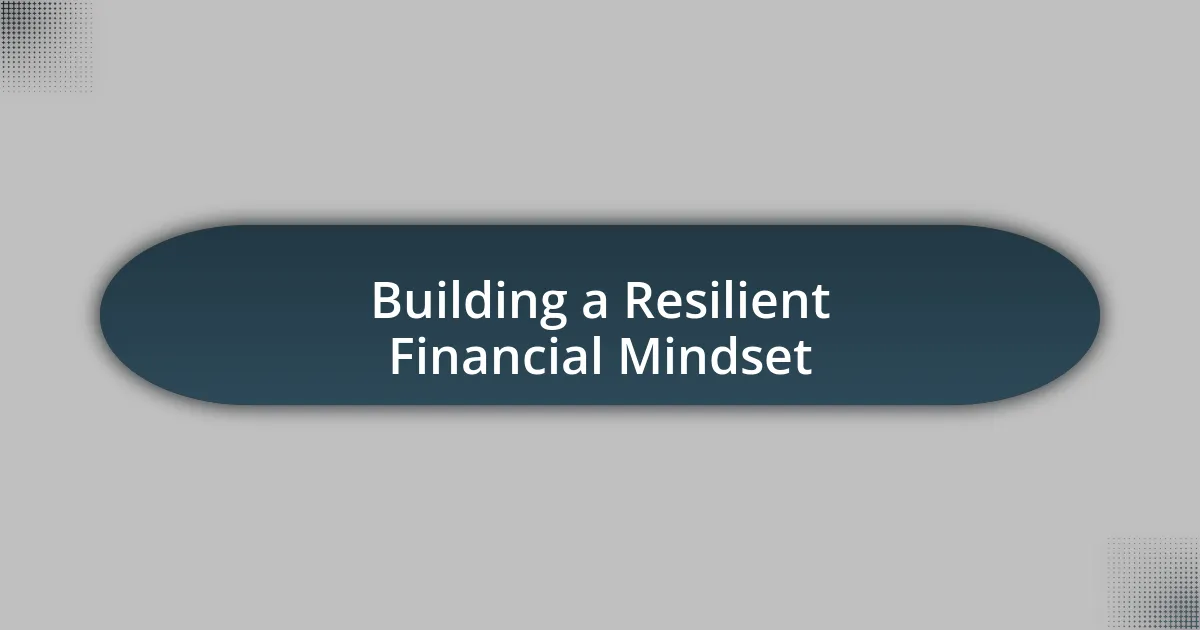
Building a Resilient Financial Mindset
Building a resilient financial mindset starts with acknowledging that mistakes and setbacks are not the end but rather stepping stones to success. I remember the first time I miscalculated my budget and ended up overdrawing my account; it was frustrating. It felt like the universe was throwing financial curveballs at me, yet instead of dwelling on my mistake, I chose to learn from it. Have you ever found yourself in a similar situation? Embracing those little failures can actually strengthen your financial resolve.
Another key aspect is cultivating a growth mindset. Instead of viewing challenges as insurmountable obstacles, I learned to see them as opportunities for growth. With each financial misstep, I began to ask myself: “What can I learn from this?” This question has helped me pivot my thinking. For example, when I faced unexpected medical bills, I realized it was time to build an emergency fund. Now, I look at financial challenges as chances to expand my knowledge and improve my future decision-making.
Finally, developing emotional discipline is crucial to sustaining a resilient financial mindset. There was a time when I would make impulsive purchases out of boredom or stress, often leading to regret later. Understanding the emotions tied to spending helped me to pause and think before swiping my card. Have you noticed how your feelings influence your financial choices? I now practice mindful spending, ensuring my purchases align with my values and long-term goals. This discipline not only preserves my financial health but also brings a sense of peace to my life.
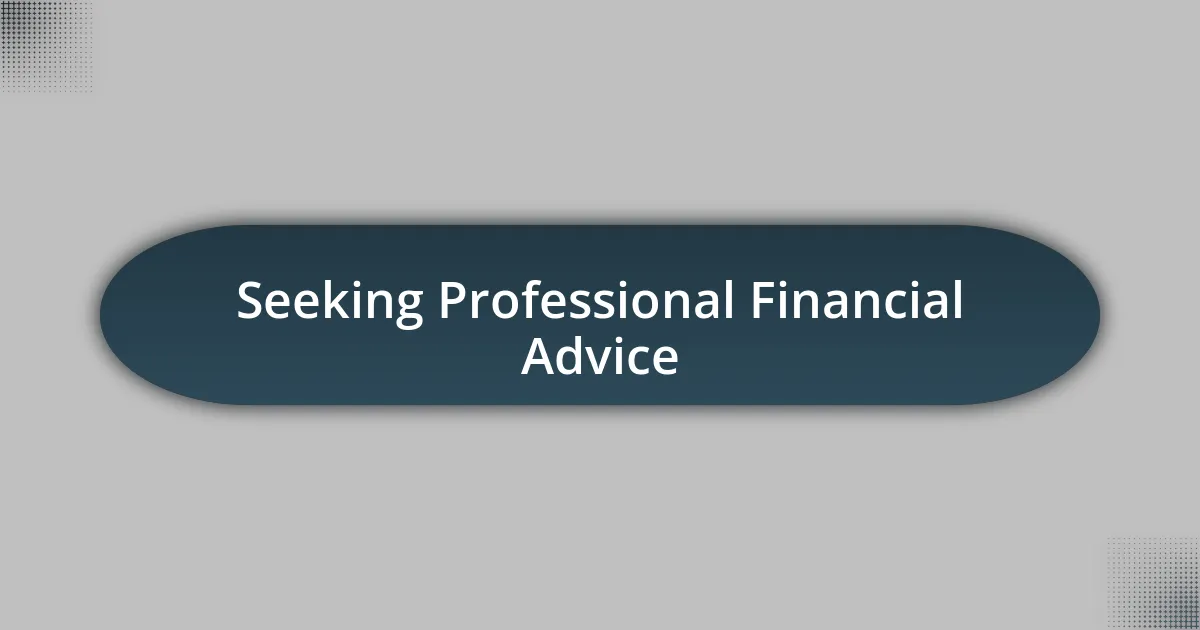
Seeking Professional Financial Advice
Seeking professional financial advice has been a game changer in my financial journey. I remember the moment I decided to consult a financial advisor after struggling with inconsistent investment returns. It felt like a weight had been lifted off my shoulders; having someone to provide tailored guidance made me realize how valuable expert insights can be. Have you thought about how different your financial path could be with the right advice?
When I first met with my advisor, I was amazed by the depth of knowledge and strategies available. They introduced me to concepts like asset allocation and risk management, which I hadn’t fully understood before. It was eye-opening to realize that I didn’t have to navigate the complex world of finance alone. Don’t you think having an expert in your corner can provide both clarity and confidence?
This experience taught me the importance of ongoing education. I now make it a point to regularly check in with my advisor and discuss my financial goals. It’s not just about having someone to rely on; it’s about cultivating a dynamic relationship that keeps me informed and proactive. Have you considered how regularly seeking professional advice can help refine your financial strategies and keep you on track?
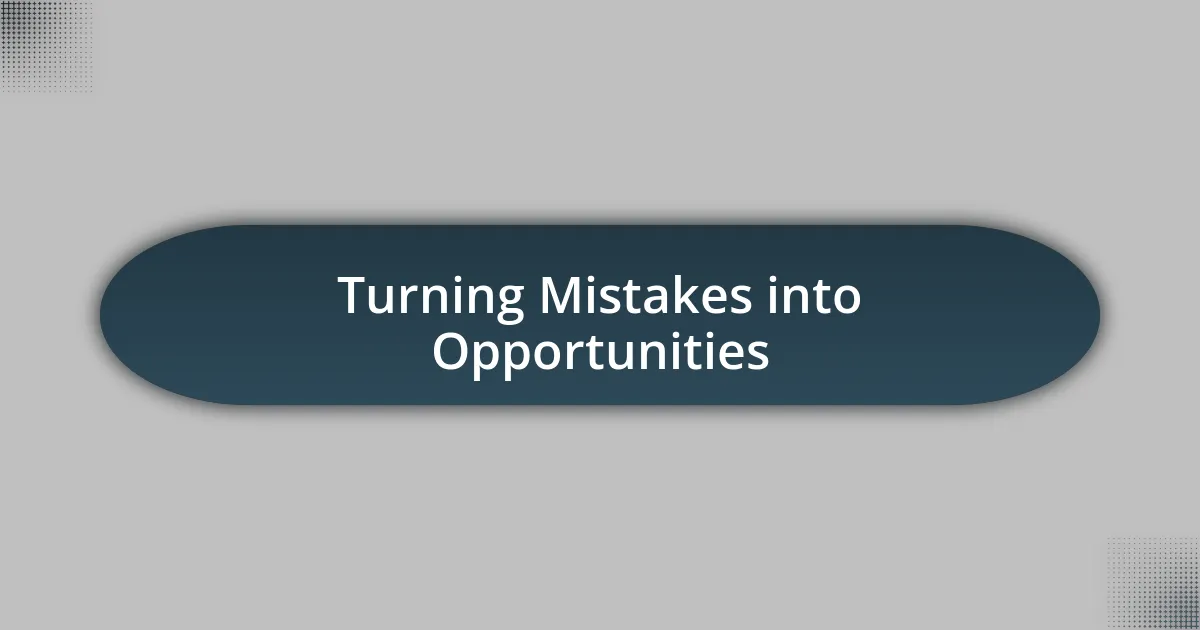
Turning Mistakes into Opportunities
Mistakes in finance can feel like setbacks, but I’ve learned they can also be amazing stepping stones to growth. After a poorly researched investment that cost me significant money, I spent countless nights reflecting on what went wrong. Instead of wallowing in regret, I transformed that experience into a deep dive into due diligence; now, I ask myself critical questions before every investment. Isn’t it fascinating how a single mistake can lead to a more informed approach?
I vividly recall a case where a budgeting error left me scrambling to cover unexpected expenses. It was stressful, but what struck me was how that mistake led me to develop a more robust budgeting system. By tracking my spending closely, I discovered hidden areas where I could cut back, ultimately freeing up funds for savings. This process turned chaos into structure, and honestly, have you ever turned a crisis into a chance for improvement?
Turning mistakes into opportunities also means fostering resilience. Each financial misstep teaches a lesson; for instance, missing a payment once reminded me of the importance of setting reminders. I realized that these little adjustments can prevent future issues, and they serve as reminders of my growth trajectory. Do you see mistakes as stumbling blocks, or can they redirect you to a path of greater wisdom?


